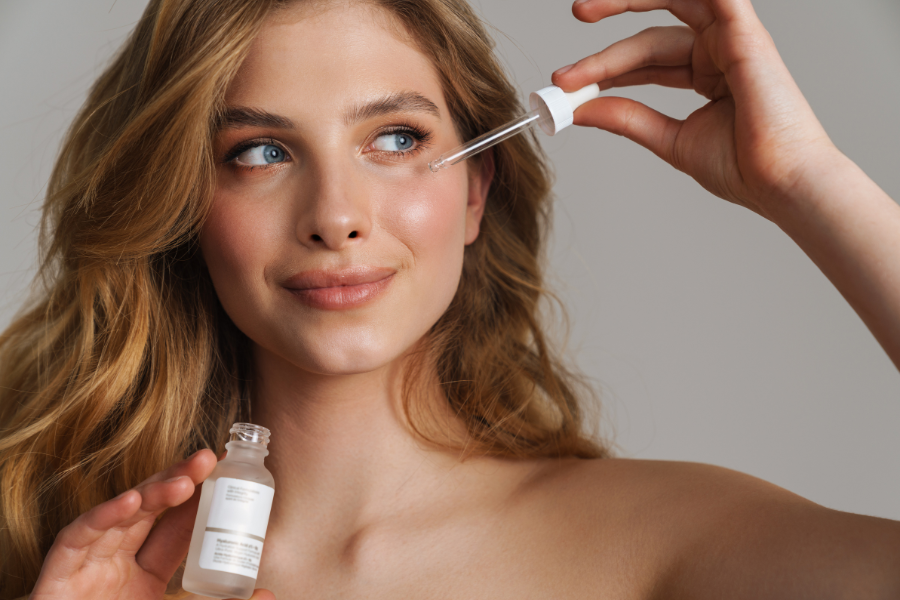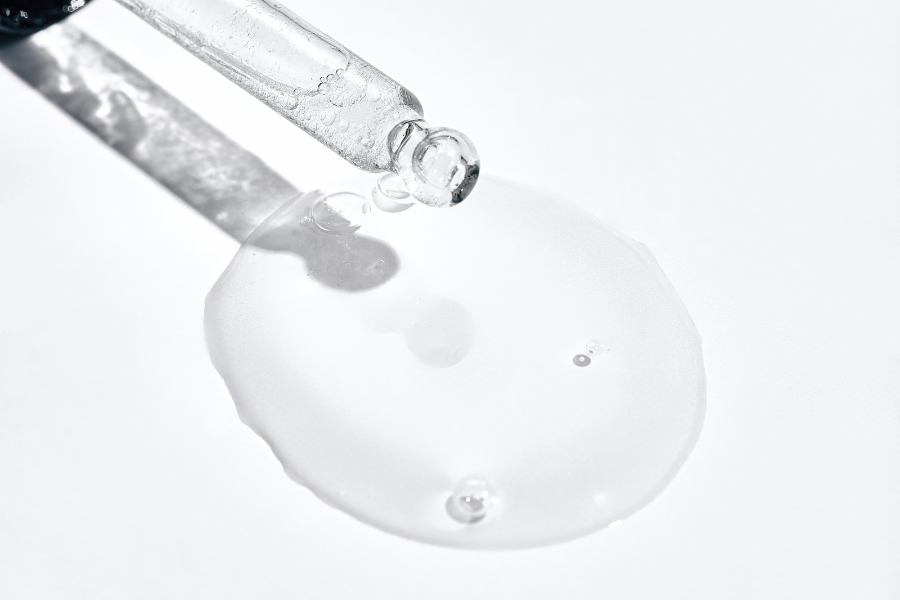GHK-Cu is a natural tripeptide found in plasma, known for its remarkable anti-aging properties. It contains copper, which plays a crucial role in overall health. During adolescence, GHK is abundant in plasma, but its levels decline with age, dropping by about 60% by the age of 60. This decline affects skin regeneration, contributing to visible signs of aging.
GHK-Cu, when incorporated into creams and serums, promotes collagen production and restores skin elasticity, combating aging effectively. Let’s see what’s topical GHK-Cu peptide used and how does it differs from the injectable form.
GHK-Cu Topical vs Injectable Form
Before getting into the perks of using GHK-Cu peptide it’s important to understand the contrast between the methods of application. While creams and serums containing GHK-Cu offer fantastic anti-aging benefits when applied directly to the skin, injections provide a myriad of potential health advantages.
If your main goal is to combat aging and achieve a youthful appearance, GHK-Cu creams and serums are your best bet. Mixing the peptide with these products makes for easy application and optimal absorption, offering a convenient alternative to Botox.
On the other hand, injections offer more than just skin-deep benefits. They allow GHK-Cu to directly enter your bloodstream, ensuring your body can make the most of its potential advantages without relying on skin absorption. This means you’re not just targeting the skin; you’re tapping into a broader spectrum of anti-aging benefits.
What are Copper Peptides Exactly?
Copper-peptide compounds are essentially combinations of copper and peptides. Peptides are short chains of amino acids, usually ranging from 2 to 50 in length. These peptides act as the foundational units for larger proteins that make up different tissues and organs in your body. Essential proteins in the skin, like collagen and elastin, rely on peptides to fulfill their roles effectively. Peptides are abundantly found in protein-rich foods, derived from both plants and animals, while some are also produced chemically.
Copper is a vital trace element crucial for many biological functions, such as collagen production and wound healing. When applied to the skin, Copper Peptides can penetrate deeply, kickstarting collagen production. Moreover, Copper Peptides act as antioxidants, shielding the skin from free radicals and enhancing its overall health.
How Does GHK-Cu Rejuvenate the Skin
Simply put, this peptide prompts rejuvenation by signaling the body’s natural processes. It essentially kickstarts the body’s innate rejuvenation mechanism. On a more complex level, GHK-CU interacts with the skin and boosts the body’s production of collagen and elastin. Numerous studies indicate that this peptide not only enhances the skin’s appearance superficially but also improves its overall health by influencing how the body interacts with the skin.
One study, conducted by the National Institute of Health, suggests that as we age, our skin loses its ability to repair damage between its layers. Additionally, our bodies produce fewer substances required to maintain the skin’s softness and elasticity. GHK-CU appears to help repair damage to the “basement membrane,” which connects the epidermis and dermis layers of the skin, and initiates the body’s natural rejuvenation process.
Another NIH study explores the peptide’s potential anti-aging properties. The results indicated that GHK-CU improved the appearance and texture of the skin for participants. Its anti-inflammatory and rejuvenating properties were found to slow down the aging process, particularly in terms of skin elasticity and overall health.
A separate study focused on the peptide’s rejuvenating and healing properties. Once again, GHK-CU was found to stimulate the production of new collagen and elastin, enhancing skin health. It also accelerated the body’s healing process for wounds and promoted the growth of new blood vessels and nerves, both crucial for skin rejuvenation.
Caution
When using copper peptides, it’s important to be aware of potential side effects. For this reason, it’s important to have the following considerations in mind:
- Perform a patch test: Before applying the Copper Peptide Serum to your entire face, test it on a small area of skin to check for any adverse reactions or allergies. Although rare, some individuals may experience mild to severe rash due to an allergic reaction to peptides.
- Avoid contact with eyes: Take care to avoid getting the serum in your eyes, as it may cause irritation. If this occurs, rinse thoroughly with water.
- Start gradually: If you’re new to using Copper Peptide Serum, begin by using it every other day or a few times a week to allow your skin to adapt. Slowly increase the frequency as your skin becomes accustomed to the product.
Always use copper peptides as directed and consult with a healthcare professional if you experience any adverse reactions.
How To Use GHK-Cu Topical Serum
To get the most out of Copper Peptide Serum, it’s crucial to follow the right steps for application. Here’s a simple approach for incorporating this potent serum into your skincare routine:
- Cleanse your face: Begin by washing it with a light cleanser to remove any dirt, oil, or makeup. Use a clean towel to dry your face.
- Dispense a few drops: Take a small amount of Copper Peptide Serum onto your fingertips. Remember, a little goes a long way, so start with just a few drops.
- Massage onto your skin: Using upward, circular motions, gently massage the serum onto your face and neck. Concentrate on areas where you want to target wrinkles, fine lines, or acne scars.
- Let the serum absorb: Allow it to seep completely into your skin before adding any other skincare products. This usually takes a few minutes.
- Follow with moisturizer: To seal in the benefits of the Copper Peptide Serum, apply a moisturizer on top. This helps hydrate and nourish your skin, completing your skincare routine.
Conclusion
GHK-Cu emerges as a potent ally in the fight against aging skin. As our bodies age, the levels of GHK decline, impacting skin regeneration and contributing to visible signs of aging. However, topical applications of GHK-Cu, whether in creams or serums, offer remarkable anti-aging benefits by promoting collagen production and restoring skin elasticity. Copper peptides, such as GHK-Cu, are essential compounds comprised of copper and peptides.
Peptides play a foundational role in protein synthesis, crucial for maintaining healthy skin structures like collagen and elastin. Meanwhile, copper contributes to collagen production and acts as an antioxidant, protecting the skin from free radicals. Incorporating GHK-Cu into skincare routines offers a promising approach to addressing the visible signs of aging, providing people with a proactive strategy to maintain skin health and vitality as they age.
FAQ
Is Copper Peptide Better Than Retinol?
Copper peptides and retinol serve different purposes in skincare. While copper peptides stimulate collagen production and improve skin barrier function, retinol accelerates cell turnover and enhances skin texture.
Can You Use Copper Peptides Under Eyes?
Yes, copper peptides can be used under the eyes. However, it’s essential to choose a product specifically formulated for the delicate eye area and follow the recommended usage instructions to avoid any irritation or sensitivity.
Is Copper Peptide Serum Better Than Hyaluronic Acid?
It depends on what are you trying to achieve. Copper Peptide Serum is ideal for boosting collagen production and providing antioxidant protection. If immediate hydration and plumping are your focus, Hyaluronic Acid is the way to go.
Do You Use Copper Peptide Serum Before or After Moisturizer?
When incorporating copper peptide serum into your skincare routine, apply it before your moisturizer. This allows the serum’s active ingredients to penetrate the skin effectively.
Get Started, Book a Free Consultation
Book a free 20-minute consultation to learn more about how this peptide can help you.



